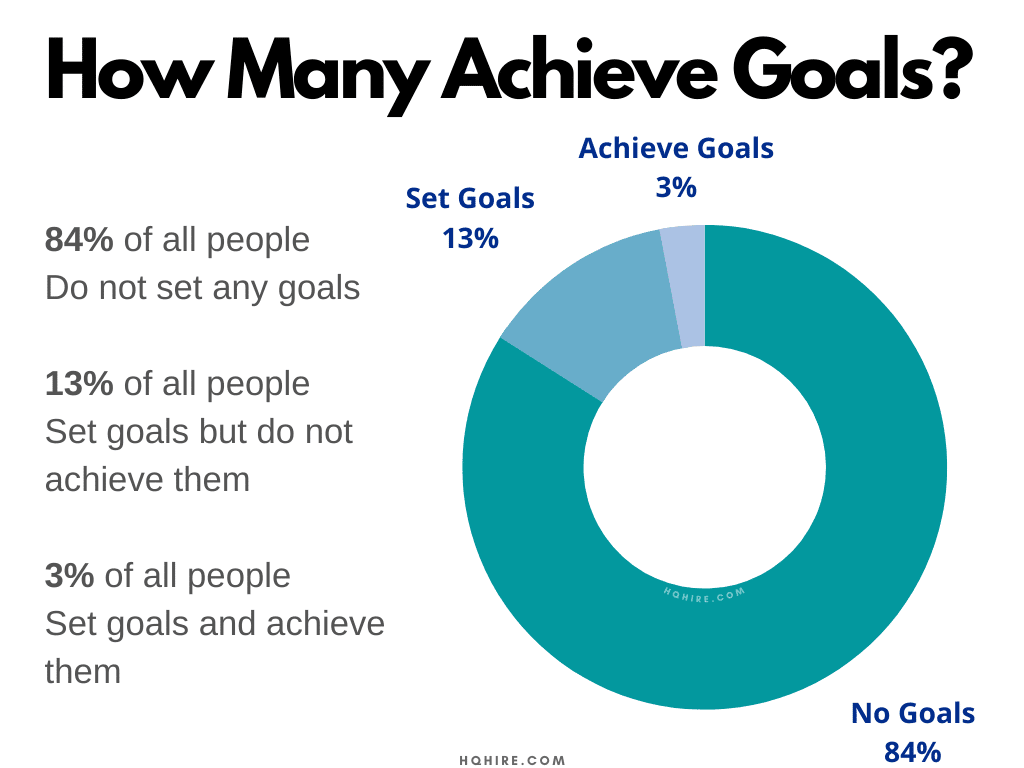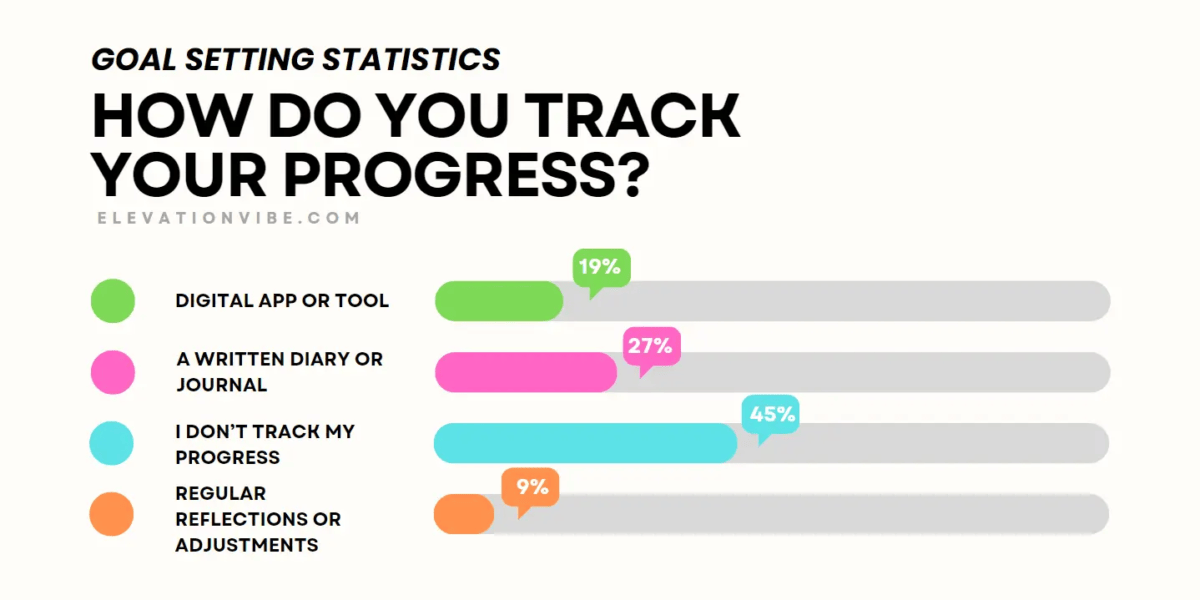Goal setting is one of the most important tactics you can use to achieve success. It’s a process of choosing specific, achievable goals that will help you move closer to your overall goal.
Achievers who write down their goals on paper and use goal-setting techniques can help increase their success exponentially even if it is a challenging goal.
Setting goals can bring you closer to success in the following ways:
- Goals keep you motivated.
- Goals make you accountable.
- Goals help you stay on track.
- Goals give you a way to measure your progress.
- Goals provide a sense of accomplishment.
There are many reasons why it’s important to set dreams and goals in both your personal life and professional career. Statistics show that people who have goals have a greater chance to achieve them than those who don’t.
Inspiring Goal-Setting Statistics Facts and Figures
The importance of setting goals cannot be overstated. Achieving goals can lead to improved mental and physical health, increased productivity, and even better relationships.
But just how important is it to set short-term and long-term goals?
In this article, we will explore some surprising statistics around goal setting and the trends and facts discovered by the scientific community and studies conducted by universities.

Written and Non-written Goals
1. People who write their goals are 20% more likely to achieve success.
The simple act of writing down your goals makes you significantly more likely to achieve them. This is because the process of putting your goals into words forces you to clarify your thoughts and better understand what you want to achieve.
2. Goals that are written down increase the chances of achieving them by 42%.
Seeing the specific goals written down in front of you serves as a constant reminder of what you are working towards, keeping you motivated and on track.
3. 13% of all people have some form of goals written, but there is no plan on how to execute them.
Having a written goal is often the first step to achieving it, but without a plan, it reduces the chances of success exponentially.
When individuals fail to take the time to develop a plan to reach their goals, it is difficult to track progress and make necessary adjustments along the way.
Having a plan on the step an individual needs to take in achieving their goal provides a roadmap for action and increases the clarity on what is required to be done to achieve success.
4. 3% of people have written goals with a plan on how to execute them.
With a plan written down, it helps the individual to provide a sense of structure and direction, which can be motivating and help to keep people on track.
A written goal with a plan helps people to better visualize their progress and feel more motivated to continue working towards their goals.
5. 3% of people who have a written goal with a concrete plan are 10 times more likely to achieve success than those who are not.
Individuals who establish written goals and create a comprehensive plan to achieve those objectives tend to be significantly more successful than the 97% of those who do not.
Individuals who take the time to set goals and develop a plan are
- Shows more commitment to achieving what they want, by creating a plan around their goal.
- Have a clear objective in what they want to achieve by writing down their goal.
- Having a written plan allows individuals to track their progress and make necessary adjustments along the way.
6. 45% of people don’t track their goals
45% of people don’t track their goals, and for the 55% of those who does, 27% use a written diary or journal, 19% use a digital app or tool, and the rest 9% rely on regular reflections to stay on track.

Setting Goals
7. 80% of managers set goals.
Most managers as reported by Harvard Business Review set goals that are clearly defined, measurable, time-bound, and specific.
8. 36% of big organizations set standardized approaches to setting goals.
There are many methods of setting goals, and 36% of all organizations have a company-wide approach to goal setting which can be useful when measuring business success in accomplishing goals.
9. 84% of all people do not set any goals.
Although goal setting is important, a study conducted by Harvard Business School shows that 84% of all people do not set any goals, which explains why most people are average and only a small percentage are considered high achievers.
10. People are 90% more likely to reach their goals and objectives if it is both relevant and reasonably challenging.
People are more likely to reach their goals if it is relevant and reasonably challenging. This is because if a goal is too easy, people may become complacent and not push themselves.
On the other hand, if a goal is too difficult, people may become discouraged and give up.
Therefore, it is important to find a balance between the two.
Informing Goals
11. 76% of all organizations cascade goals.
Surprisingly only 76% of the organization cascade their goals, meaning only 3 out of 4 CEO cascade what is the company goals to their upper management down to the lowest employee.
12. 51% of top management knows what is the company’s goals.
Only half of all top management team knows what they are doing and how they progress towards the company’s goal.
Progressing Towards Goals
13. People who follow a set scheduled action in commitment to the goal are 76% more likely to succeed in their goals.
A higher rate of achieving goals for people who have set a scheduled action because they have the plan to follow. Having a plan helps them to be less likely to get sidetracked or forget what they are supposed to be doing.
Setting a schedule means making a consistent effort to stick to their goals, and setting time available beforehand for them to work towards their goal.
14. Presenting weekly progress reports to a supportive audience increases your success to achieve your goal by 40%.
A study by the Journal of Applied Psychology shows, that presenting weekly progress reports to a supportive audience helps to hold the individual accountable and provides motivation to continue working towards the goal.
Furthermore, presenting a progress report is a way of receiving feedback from others which can help the individual identify areas of improvement.
New Year Resolution Goals
15. 25% of all New Year’s Resolutions will be given up within a week.
New year resolutions are often broken because they are unrealistic or unattainable. People set resolutions that are too high, and when they don’t meet them, they give up.
These New Year’s Resolutions also tend to be vague, so it’s hard to know when you’ve actually accomplished them.
For example, a resolution to “lose weight” is too general – how much weight? And what does that mean – eating less, working out more?

16. 9% of all people succeed to accomplish their goals set during the New Year Resolution.
1 in 10 people achieve their goals set for their New Year Resolution while the other 9 don’t, the higher rate of success is mainly due to the:
- Setting resolutions at the beginning of the year gives people a fresh start.
- People are more motivated to make changes in their lives when there is a clear distinction between the past and the future.
- People work with others who are committed to achieving their goals.
Likewise, setting career goals at a new job, or setting goals to help you progress in your career during your performance review will let you have a higher chance of success.
17. 35% of all people fail to accomplish their goals set during New Year’s Resolution due to setting unrealistic goals.
Unrealistic goals are goals that are either too ambitious or do not have the plan to achieve them.
Setting unattainable goals can lead to discouragement and a feeling of failure.
Thus, it is important to set smaller goals that can be accomplished over time. This will help to build momentum and lead to larger accomplishments in the future.
18. 33% of participants did not keep track of their progress.
19. 77% of people stick with their New Year Resolution for a week and drop to 64% at two weeks.
A week from making the new year resolution, more than 3 out of 4 new year resolvers are able to stick to what they set and plan for the year.
But the number of people who are able to stick to the plan dropped drastically by 13% at the end of 2 weeks.
Most of the new year resolution is abandoned within 1-2 weeks, mainly because the individual fails to make an adjustment to their goals.
20. 50% of the people stick to their New Year Resolution after 3 Months.
According to the studies from the University of Scranton, at the end of 90 days, only half of the new year resolvers will stick to their new year resolution.
21. 46 % of people will stick to their New Year Resolution after 6 Months.
Following the studies by Norcross JC, Mrykalo MS, and Blagys MD., 46% of the new year resolvers are able to stick to their new year resolution.
The drop in the new year resolvers from the 3-month mark to the 6 months mark is minimal, probably due to the effect of adapting the new habits that are nurtured in the first 3 months.
22. 44% of Americans will likely make a New Year’s Resolution for the next year.
Almost half of all American love to make New Year’s Resolution of some form at the start of each year, or at some time of the year.
23. 12% to 18% of people will make a New Year’s Resolution.
Only 1 in 9 people will likely make a New Year’s resolution for the next year, which is much lower than the amount of Americans where almost half of the population make New Year’s Resolutions of some sort.
What Are The Most Common Goals in Life
People have all sorts of different goals in life. Some people want to be wealthy and successful, others just want to be happy, and the rare few want to make a difference in the world. But what are the most popular goals in life?
Here are the 10 most popular goals people set during their New Year’s Resolution.
| Goals | Percentage |
|---|---|
| Exercise more | 48% |
| Eat Healthier | 44% |
| Lose weight | 41% |
| Spend more time with family and friends | 34% |
| Spend less save more | 24% |
| Spend less time on social media | 21% |
| Reduce stress on the job | 21% |
| Improve work performance | 20% |
| Quit Smoking | 20% |
| Drink less alcohol | 18% |
Setting goals in life is important for many reasons.
- Set goals to meet physiological needs; such as food, water, and warmth.
- Set goals to meet the safety needs; such as security and a sense of safety.
- Set goals to meet the need to love and a sense of belonging; such as friends, family, and intimate relationships.
- Set goals to meet the need for self-esteem; such as a sense of accomplishment or achievement at work.
- Set goals to meet self-actualization needs; such as achieving one’s true potential and creative activities.
Studies found set and writing your goals together with being specific about your goals significantly increases your goal success.
Goals give people something to work towards and something to measure their progress.
People feel a sense of accomplishment when they achieve their goals, which can lead to happiness and a better quality of life.
Read Also:
- +21 Best Types of Goal Setting Techniques (Succeeding at Work)
- 22+ Goal Setting Statistics You Should Know in 2024 (Facts and Studies)
- Ultimate Guide to Hoshin Kanri (Policy Deployment) Strategic Planning (Step Guide)
- Management By Objectives (MBO) Goal Setting Model (Examples and Templates)
- OKR Framework: Ultimate Guide to Achieving Key Result & Goals (with Templates + Examples)
Join over 11,000+ achievers who are committed to achieving their career goals!







